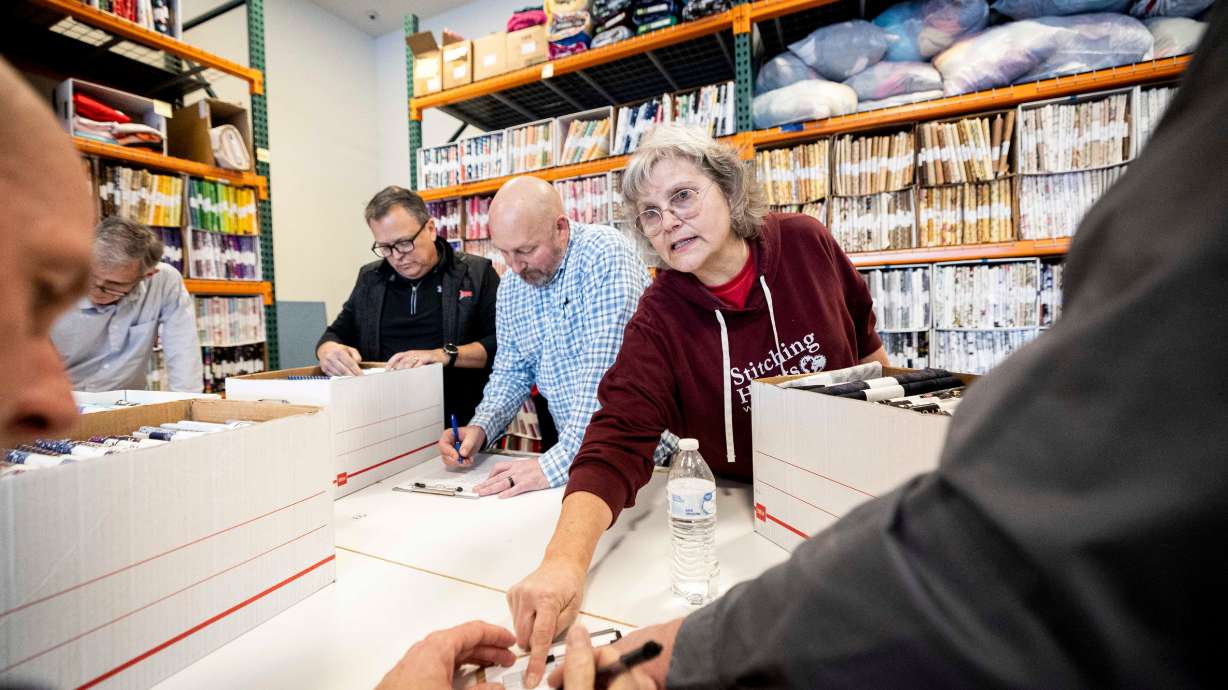Estimated read time: 4-5 minutes
- Stitching Hearts Worldwide transforms plastic bags into sleeping mats for the homeless.
- Krysti Wright founded the organization, which now distributes thousands of mats annually.
- Wright emphasizes the joy of service and aims to involve more community groups.
PLEASANT GROVE — Question: What do you get when you pull out that wad of plastic bags you've collected from the grocery store over the past who knows how many months and drop them off to Krysti Wright and her friends who like to sew?
Answer: warm sleeping mats for the homeless.
Almost every weekday, at a nondescript storefront on Pleasant Grove's Main Street, a kind of magical alchemy takes place when the women (and the occasional man) at Stitching Hearts Worldwide render the despised (but considered necessary by much of humankind) grocery bags into something so practical that the world's most hardened climate cynic would be hard-pressed to find anything to complain about.
Through a weaving process that requires about two hours per mat, 350 plastic grocery bags, on average, are cut into strips that are then intertwined together to produce a ground covering that is reckoned to warm up a cold sleeping spot by as much as 40 degrees.
Stitching Hearts quietly produces and distributes thousands of these mats every year, to locations both far away, like Bangladesh and Guatemala, and right next door, like the Provo Food Bank.
"They tell us every time they put them out, they're gone," says Wright.
Truth is, plastic sleeping mats were the farthest thing from her mind eight years ago when Wright started Stitching Hearts out of her Pleasant Grove garage.
She was facing something of an existential crisis in 2016, due to the fact the eight children she had raised with her husband, Victor Wright, were now considered old enough to take care of themselves.
"Now what?" the 54-year-old asked as she stared into an uncertain future.

In searching for an answer, she found inspiration in a talk by a Latter-day Saint leader named Cheryl Esplin, who suggested that God will use our hands to help others, but first it's up to us to figure out what to do with our hands.
Well, thought Wright, I like to quilt.
So she decided to make quilts for the disadvantaged and the dispossessed.
It was amazing how fast things started happening after that. Within days, a fellow humanitarian named RoseAnn Gunther with the Launfal Foundation dropped off two thousand yards of fabric at Wright's garage door. Within a few more days, quilting friends who had heard about Wright's venture volunteered to help turn all that fabric into quilts.
It's gone on and on like that for eight years and counting. Stitching Hearts has had four homes, each one bigger than the last, from the Wright's garage to the 3,000-square-foot space they now occupy on the corner of Main Street and 100 South in Pleasant Grove. They are almost literally in the center of town, thanks to a landlord who gives them a break on rent because of what they do and whom they serve.

The number of regulars who volunteer has grown into the hundreds (including many weavers who date back to the very beginnings), while the inventory has expanded to include, besides quilts, blankets, dolls, toys, rugs, backpacks — and most significantly, the plastic sleeping mats.
Besides producing the mats at the charity's headquarters on Main Street, Stitching Hearts regularly travels to sites around the state, providing fabric, looms, other materials and know-how for groups desiring to hold service projects. Wright has 34 area managers throughout Utah who handle the logistics for setting up these remote events.
As for rounding up enough plastic grocery bags to make the mats? Rest assured that collecting them has proven to be the easiest part of the whole operation.
"Every day we have people drop by with tons of bags they've been saving and don't know what to do with," says Wright. "Plastic multiplies like rabbits."

Delivering more than 4,000 quilts and some 20,000 sleeping mats to her fellow men through the years has proved to be as gratifying as expected for Wright, but along the way she discovered an even more satisfying reward she never saw coming.
"When I first started I thought it was how many quilts can I produce," she says. "Eight years later, I look back and see that it's not as much about the production as it is about providing people a way to serve.
"I've found what makes me most happy is watching other people be happy in their service."
Her goals going forward — and rest assured, at 62 she has no plans to stop — are to get even more groups involved.

She'd like to see inmates at the prison make the sleeping mats, for one example, and women in women shelters and refugee groups and so many others she feels would benefit from the win-win-win service.
Beyond getting tons of plastic grocery bags out of circulation, beyond getting thousands of the homeless off the ground when sleeping, it's the mere making of the mats that holds its own reward.
"It's just amazing what that (service) does for people," she says.
(For additional information about signing up for service projects, how to volunteer, ways to donate, and to see a video about the making of the sleeping mats, go to stitchingheartsww.org).









